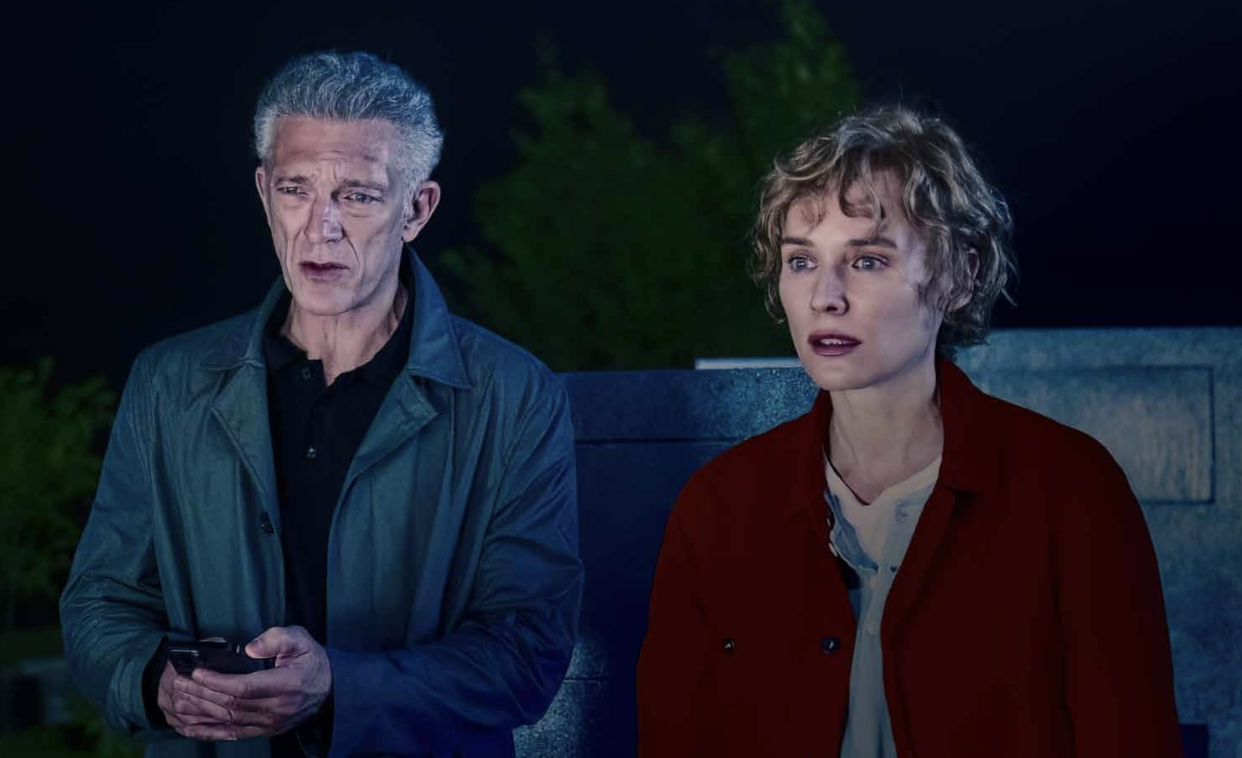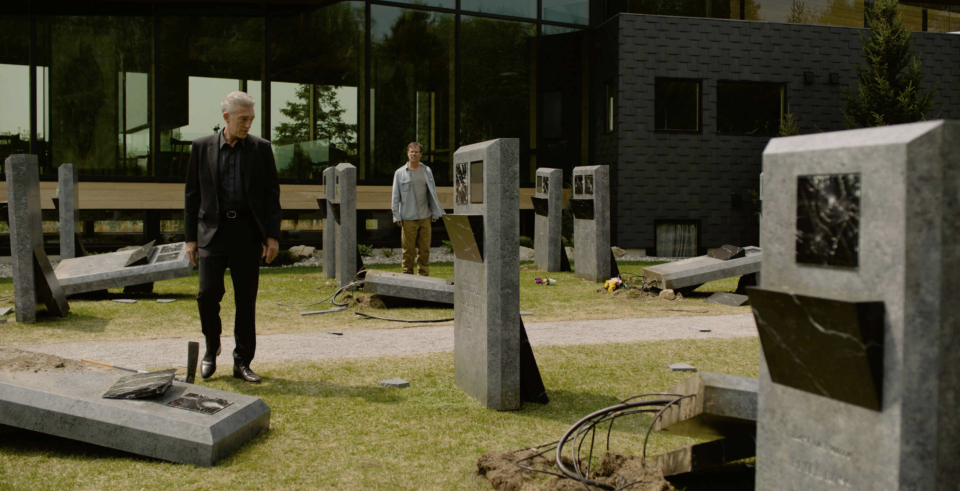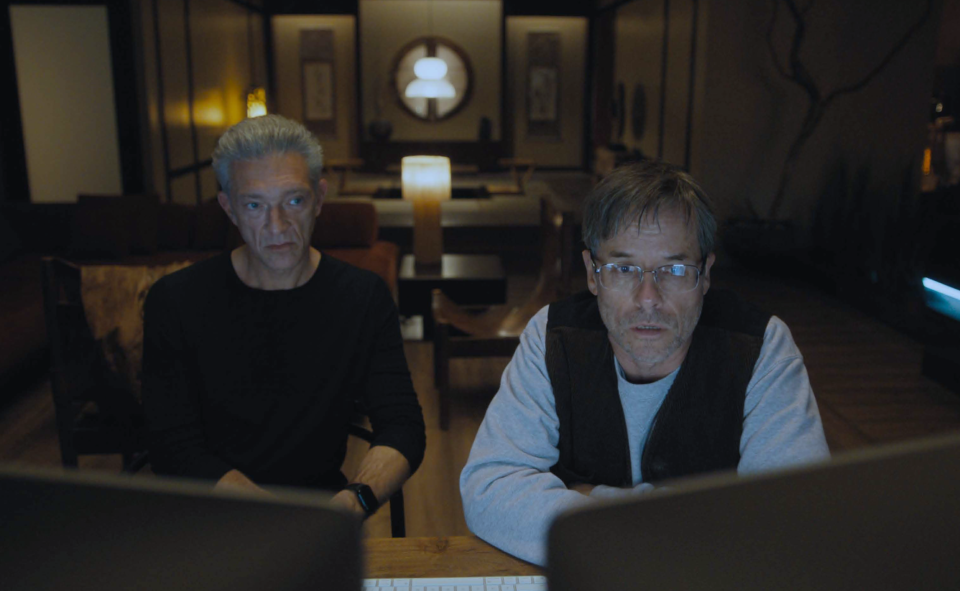‘The Shrouds’ Review: David Cronenberg Draws on His Wife’s Death for a Brilliantly Cerebral Thriller About the Physicality of Grief

- Oops!Something went wrong.Please try again later.
- Oops!Something went wrong.Please try again later.

Inspired by the loss of the director’s wife, “The Shrouds” is a grief story as only David Cronenberg would ever think to shoot one: Sardonic, unsentimental, and often so cadaverously stiff that the film itself appears to be suffering from rigor mortis, as if its images died at some point along their brief journey from the projector to the screen. And really, what else would you expect? I suppose it’s possible that the story’s deeply personal context might have spurred Cronenberg to push against the tender sterility of his recent features, or even dare to expose the soft underbelly that’s always been hiding inside his tumorous body of work and its many layers of scary-beautiful new flesh. If so, it almost immediately becomes clear that he had zero interest in accepting that invitation.
A quintessentially late film from an artist who’s always been ahead of his time, “The Shrouds” is Cronenberg at his most inhospitable; so far as the project’s emotional availability and commercial appeal are concerned, it makes “Crimes of the Future” seem like “Barbie” by comparison. And yet, as with so many of Cronenberg’s most resonant movies, its morgue-like coldness eventually reveals itself to be deeply comforting to some degree — if not while you’re watching it, then perhaps as its big ideas begin to seep into your bone marrow during the days and weeks that follow.
More from IndieWire
Between its paranoid scramble of a plot and a protagonist who becomes increasingly difficult to see as anything more than an avatar for its auteur, “The Shrouds” lends itself to a sort of delayed appreciation; its story only makes sense with the detached perspective that might begin to develop in the time between the death of a loved one and the funeral service at which they’re laid to rest. Body is reality, Cronenberg likes to say, but what becomes of that reality when the body in question is buried six feet under the ground?
“The Shrouds” first stands out from the rest of its director’s corpus because its focus is less on the flesh than it is on the bones underneath; any and all traces of skin have already rotted off the body of the main character’s late wife by the time the film begins. She’s been dead for four years, which has apparently been long enough for her widow — a Toronto-based futurist and “producer of industrial videos” — to create a well-funded proof-of-concept for a bold new innovation in grieving.
His name is Karsh, he’s played by a smirking Vincent Cassel (whose slab-like face and wiry gray hair make him a dead ringer for Cronenberg, even before he dons the sunglass that complete the illusion), and the fancy technology that afforded him his Tesla is called “GraveTech,” which is start-up speak for a wired cemetery that allows mourners to watch their loved ones rot in real-time, either with an app on their phones or via the monitors affixed to the top of each headstone. It’s effectively a cinema of the dead, as so many conventional films have become since they were shot.
On that night, it’s possible that actual cameras are involved in the GraveTech process, but the bulk of the data that comes back from the beyond is generated by the radioactive shrouds that Karsh slips his corpses into before they’re buried; imagine the sort of sexy funeral gown that might debut at Fashion Week and you’ll have the right idea. At the very least, you’ll understand why this is one of several Cannes movies this year co-financed by the production arm of Yves Saint Laurent.
Karsh believes his morbid invention will allow people to maintain a meaningful relationship with the bodies of their life partners, even in death. His personal experience suggests that installing an open window into a closed casket could help to stabilize the disorientation that follows a devastating loss, if only because the ability to see a departed spouse as they decompose on a screen might lend the dead a more literal and continuing presentness than an offline coffin ever could, preserving them as a fact instead of an idea. Where is Karsh’s wife? Well, she’s right underneath the lawn outside of his restaurant, and you can effectively FaceTime with her whenever you want (yes, our man has built a slate-gray restaurant next to GraveTech’s test cemetery, a biting testament to his “life goes on” ethos as well as the setting for the mordantly hilarious blind date he enjoys at the start of the film, which proves typical of the very dry wit to come).
It’s a relatively safe and solid concept, at least by the very low standards of technology created by someone in a David Cronenberg film, and it seems to be fulfilling its intended purpose for Karsh and his clients. But there are… complications. For one thing, GraveTech hasn’t been able to stop Karsh’s teeth from eroding because of the grief — this may be the talkiest movie that Cronenberg has ever made, subject to even more verbal logorrhea than we got with “A Dangerous Method,” but his characters are still better expressed through their bodies than they are with their words.

For another thing, GraveTech is traumatically vandalized by a mysterious group who seem to have a problem with the ethics of Karsh’s technology, and may or may not have something to do with the Hungarian billionaire who wants to franchise the business across the world. Such enemies, whoever they are, reflect the incongruity of a tool which promises its customers a kind of stasis that’s at odds with the mutability of our mortal forms, even in death (all of the trouble starts when Karsh notices new bone deposits growing in his dead wife’s nasal cavity). Aside from his French accent, Karsh’s failure to anticipate this dilemma is perhaps the most obvious difference between himself and the director he so pointedly resembles, who’s made that tender hubris the subject of his work for so many decades.
Alas, Karsh is a fictional stand-in for David Cronenberg instead of the real McCoy, and that means he’s filled with fanciful hopes and surrounded by characters who solely exist to confound them. Characters like Diane Kruger’s Terry, a prickly dog groomer and the sister of his Karsh’s late wife Becca, who happens to look exactly like her. What psychic stress might that incur for a man so determined to remain in touch with his spouse that he created a surveillance camera on which he could spy on her for all eternity? And just to add injury to insult, Kruger also plays Becca, appearing nude in a morose series of nightmares that find Karsh relieving the various, mutilating surgeries that his wife endured as part of her cancer treatment at the hands of a doctor who she used to date.

Kruger’s performance in these segments of the film is as heartfelt and haunting as her embodiment of Terry is barbed and threatening, and that moving duality — galvanized by one of the most psychosexually arresting love scenes in recent memory — would be more than enough to make this the best work of her career even if she didn’t also play the AI assistant who organizes Karsh’s life. But she does, and boy does her Siri coding have a few bugs to work out. That would be a job for Terry’s ex-husband Maury (Guy Pearce in “Iron Man 3” mode as a frayed and surprisingly convincing beta nerd who can’t move on because the woman he lost still lives right down the street). Hunny, as the AI is known, is another facet of this film’s many-faced obsession with the notion of body hacking and the unknown extent to which technology might be used to cheat grief.
Ever the pragmatist, Cronenberg knows better than to fall into that trap himself, but does that make him cruel for organizing Karsh’s entire life around the same principle? That question will become a beguiling lifeline as “The Shrouds” departs from coherent narrative logic and begins to unfold itself in the murky waters of international conspiracy and accusations of schizophrenia — slowly at first, but then so fast that you can no longer tell which way is up.
Cassel’s slowly eroding smarm makes it amusing enough to watch Karsh fumble his way deeper and deeper into the maze of his own emotions (presumably as a means of sparing Cronenberg from suffering the same fate), even though the direction is so sedate and antiseptic off that it often feels as if the film isn’t moving forward at all. The flat aesthetic — and Howard Shore’s complementary score, which supplies more of the same numbing drone that he gave to “Crimes of the Future” — befits a story about a man struggling to deny the colorlessness of life after loss, and looking in all of the wrong places for a vibrancy that might take its place. “I lived in Becca’s body,” he tells someone, in a vintage piece of Cronenbergian syntax. “It was the only place I really lived.”
“The Shrouds” is therefore a film about Karsh’s pursuit of a new home, which is made impossible by his aching desire to return to the old one. It’s a spiraling maze to nowhere in which the only way out is to make peace with the fact that there isn’t one, and every plot detail that Cronenberg throws into the mix — from Karsh’s tortured relationship with Terry to his flirtation with a blind woman and his Skype beef with someone on a volcano in Iceland — amounts to a red herring in the hero’s quest to stop a feeling that he carries with him wherever he goes. Avoiding the reality only complicates the reality; the shrouds don’t allow Karsh to see his dead wife more clearly, they obscure his ability to see real life at all.
Ours too, to some extent. What I love about “The Shrouds,” and why I can’t stop thinking about it, is that it remains completely unresolved as to GraveTech’s ultimate value. While I’d argue that Cronenberg doesn’t evince much faith in the purported function of this death technology, that doesn’t stop him from seeing a measure of quixotic and all-too-human sweetness in Karsh’s quest for continued signs of life. Becca is gone, and no trick of the imagination will bring her back. There’s something to be said for the old-fashioned brain hack that out of sight is out of mind. But how beautiful it is that we’ll always keep looking for our loved ones in the world, even when we know exactly where to find them.
Grade: A-
“The Shrouds” premiered in Competition at the 2024 Cannes Film Festival. It is currently seeking U.S. distribution.
Best of IndieWire
Sign up for Indiewire's Newsletter. For the latest news, follow us on Facebook, Twitter, and Instagram.

